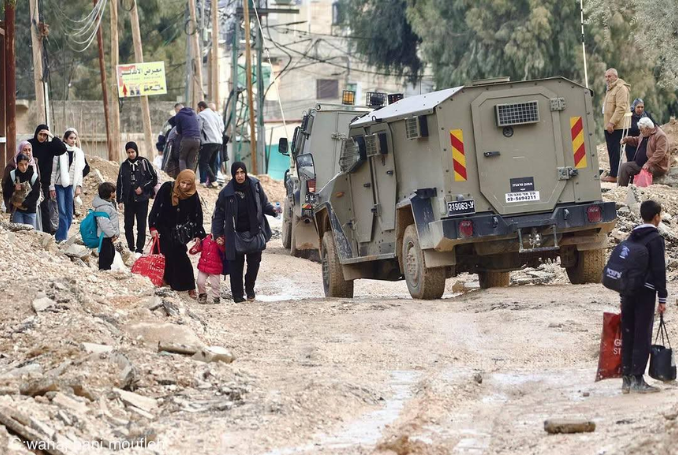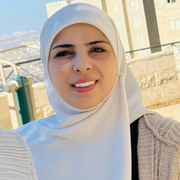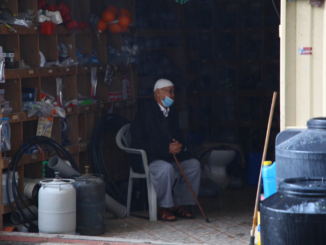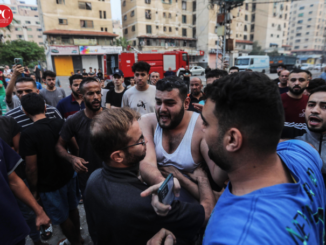
A journey of exodus into the unknown, but this time in Jenin, not Gaza. It seems that the Israeli army is using its same policies everywhere.
Ahmed al-Hawashin and his family of nine were forced to leave their home in the Al-Hawashin neighborhood in the Jenin camp, after threats from the Israeli army.
While the Israeli military operation in Jenin and its refugee camp continues, more atrocities are being revealed. In addition to expelling residents from their homes, Israeli soldiers continue to fire randomly at anyone who moves.
According to Ministry of Health data that is updated around the clock due to the succession of events, 12 dead and more than 40 wounded by Israeli army bullets have been recorded since the beginning of the invasion on January 21.
‘We Felt Like We Were in Gaza’
The Israeli army used the method of forcing Palestinians to leave their Jenin camp, similar to its actions in the Gaza Strip.
It didn’t order them to leave their homes but threatened them with violence if they stayed. They told the refugees that they would “destroy the camp over their heads”, if they defied military orders. Additionally, it cut off all essential supplies to force them to leave.
‘I Was in a Grave’: Freed Palestinian Female Prisoners Share Their Stories with Palestine Chronicle
Although there were no armed men in the houses, Israeli soldiers threw hand grenades at civilians, including women and children, prompting them to flee, eyewitnesses told the Palestine Chronicle.
After packing their bags with basic items, Ahmed’s family left their home and walked along a corridor designated by the Israeli army.
In addition to the soldiers’ threats of a harsh strike on the refugee camp, the near-total destruction of the camp’s most basic infrastructure was another reason behind the displacement of many families.
“We left the neighborhood toward the Al-Awda roundabout, and there the army divided us into groups of five. Then they searched us and examined us using automated cameras positioned several meters away, while a drone flew above us the entire time,” Ahmed told the Palestine Chronicle.
Anyone the Israeli army deemed wanted or suspicious was arrested, stripped, and set aside, bound and blindfolded.
“We walked on foot—among us women, children, and the elderly—for more than a kilometer. It was a harsh scene, and we felt like we were in Gaza. Then we dispersed to the homes of relatives and friends outside the camp,” Ahmed added.
‘Iron Butterfly’ Explosive Bullets – Israel’s Deadly Weapons Targeting Palestinians
Israel has threatened to continue its military operation for months, aiming to eliminate what it calls hotbeds of terrorism. This heightens the fear of those displaced from their homes, who do not want to leave them for an extended time.
The United Nations Relief and Works Agency for Palestine Refugees (UNRWA) stated that conditions in the Jenin camp are catastrophic, with more than 2,000 families displaced and basic needs almost entirely absent.
‘Our Homes are Barracks’
Anyone who looks out the window risks being shot. Anyone who moves in a vehicle risks being killed. This is how life has become in the city.
Hospitals were the first to be besieged in Jenin. The Israeli army placed dirt barriers at the entrances to Jenin Governmental Hospital, preventing access.
During the initial hours of the city’s storming, three doctors were injured in the courtyard of Al-Amal Hospital by bullets fired by the Israeli army, which deliberately shot randomly to intimidate residents.
Ambulances cannot move freely in the streets, resulting in the death of many Palestinians who were left to bleed. Access to the injured is also obstructed by the Israeli army, which stops paramedics, checks the identities of the wounded, and arrests whomever it chooses.
Nadine Abu Shamla, a resident of Jenin, described the situation as very difficult, noting that Israel continues to push more military vehicles into the city, including a large number of bulldozers.
‘Cowboy Method’ – Netanyahu and Smotrich’s Annexation Strategy
Raids on many homes continue in the mountain area of the Jenin camp, parts of the new camp, and other areas on the outskirts, with the number of detainees still unknown.
“The soldiers blew up the walls of houses and opened them from the inside to move freely. They also occupied many homes, turning them into military barracks,” Nadine told us.
Additionally, there are widespread power and water outages in the city and camp. The communications and internet network is also very weak due to warplanes and drones flying over the Jenin camp around the clock.
“This raid differs from previous ones in terms of the number of military vehicles, the brutality of the soldiers, and their precise and harsh procedures,” Nadine added.
(The Palestine Chronicle)

– Fayha’ Shalash is a Ramallah-based Palestinian journalist. She graduated from Birzeit University in 2008 and she has been working as a reporter and broadcaster ever since. Her articles appeared in several online publications. She contributed this article to The Palestine Chronicle.









Be the first to comment